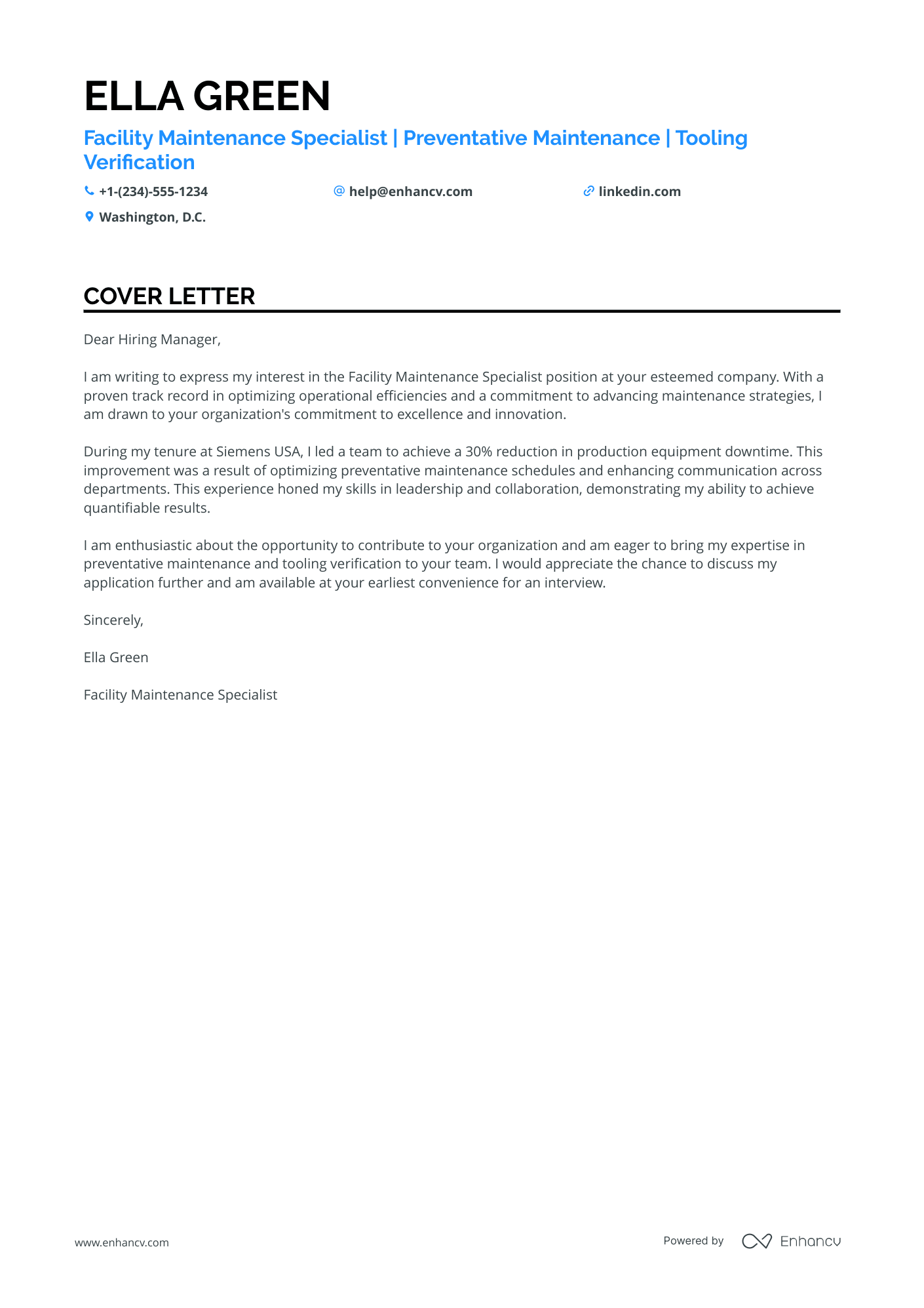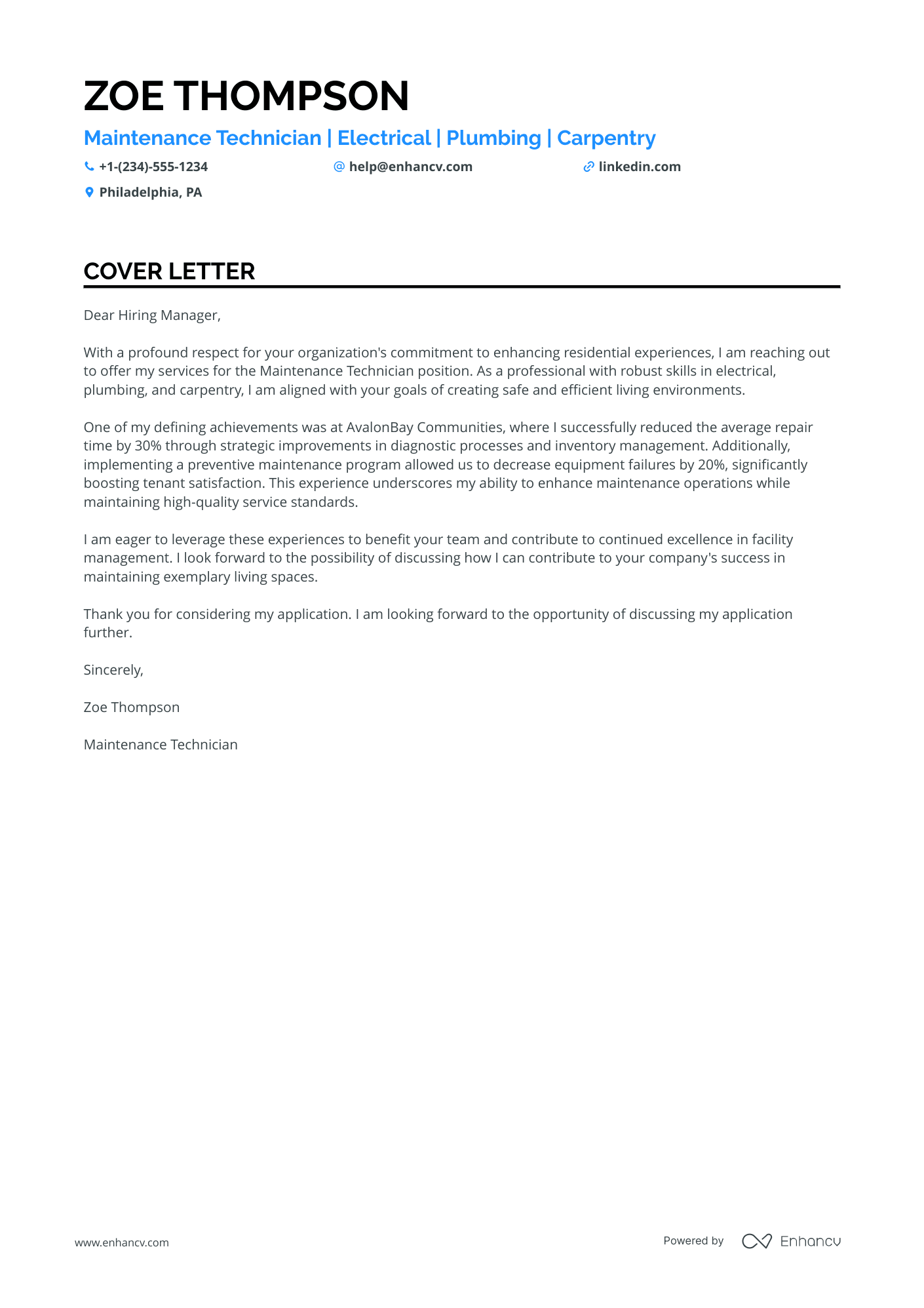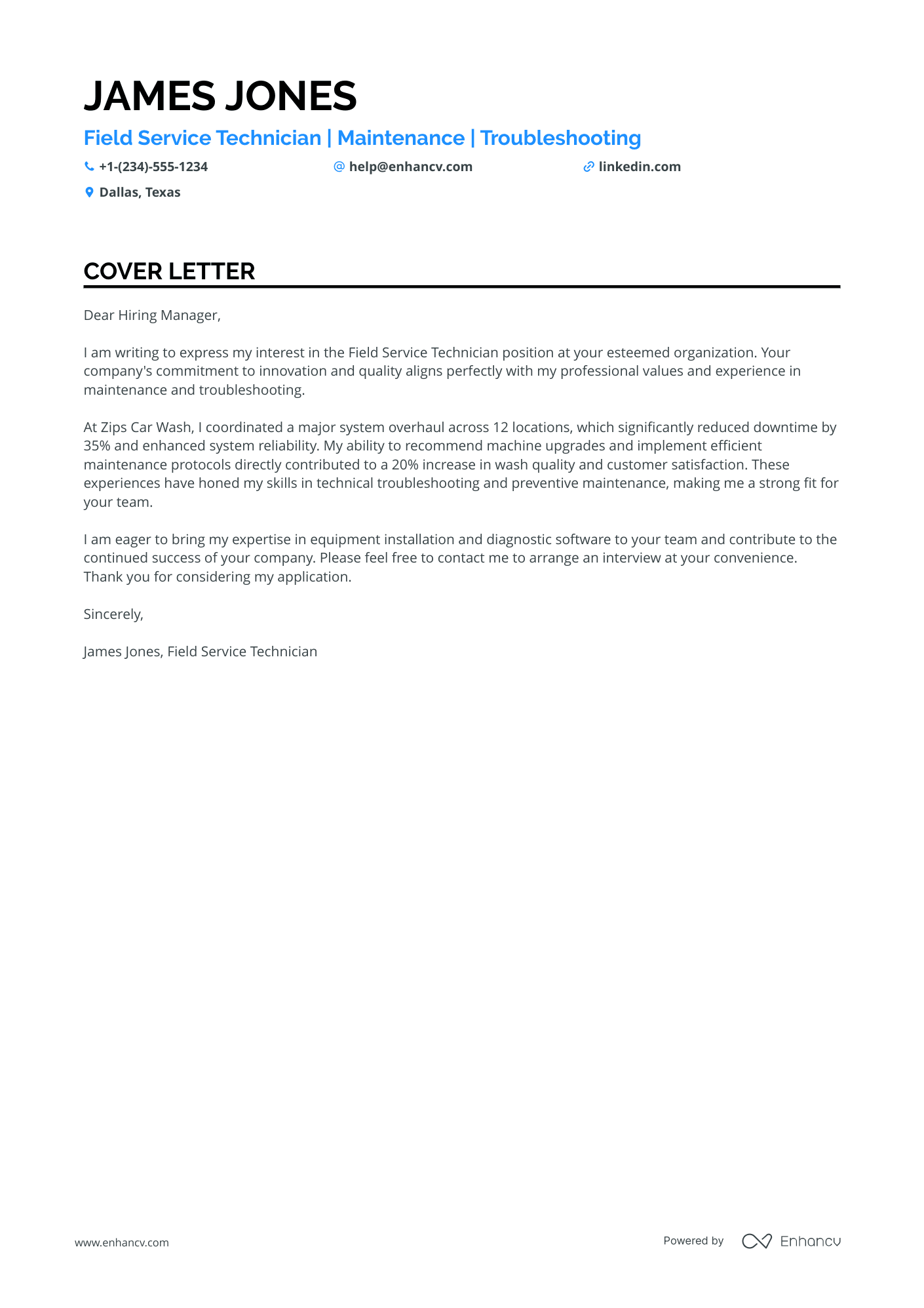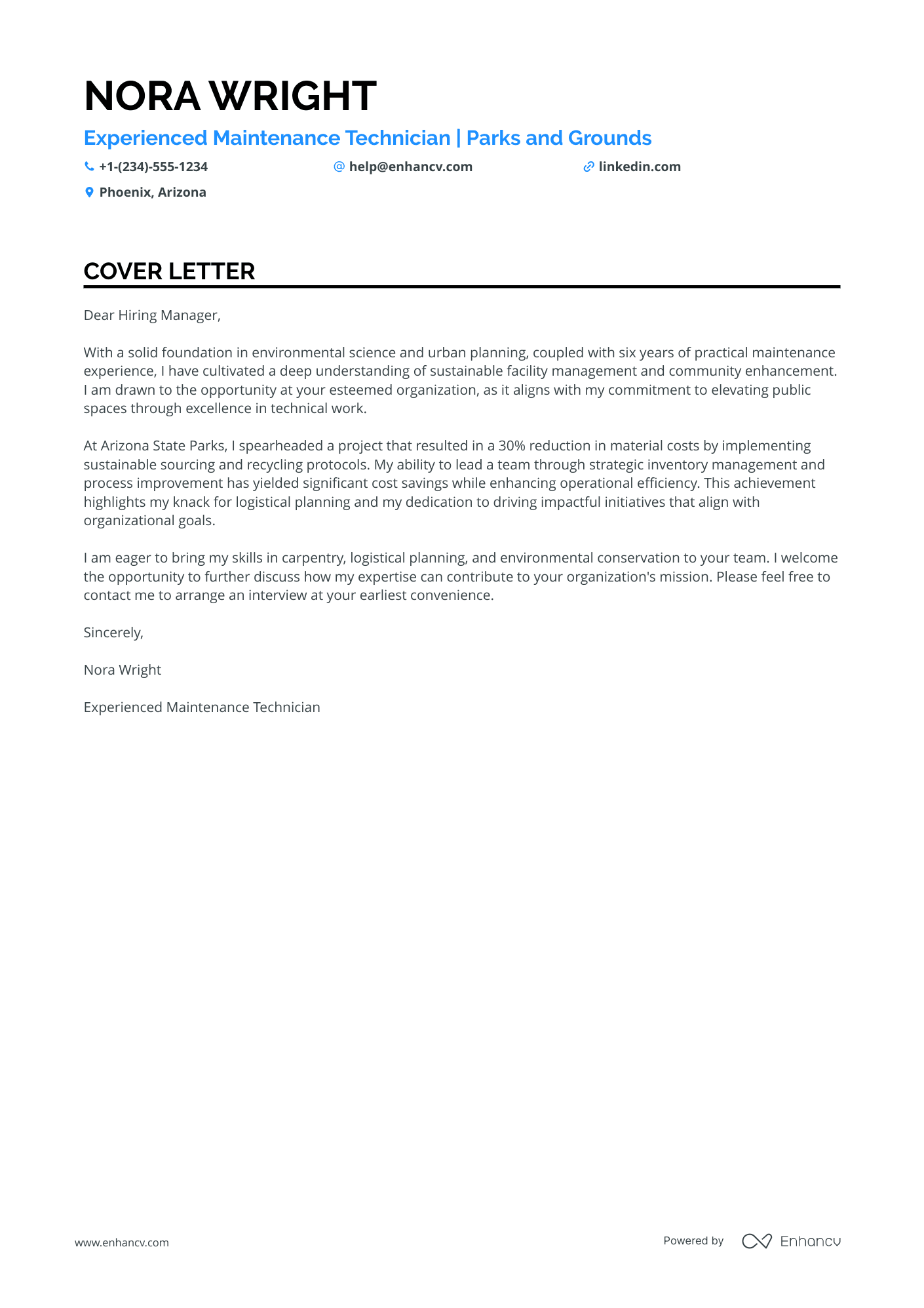Embarking on your job hunt, you've likely encountered the need for a standout maintenance technician cover letter. It's the hurdle often stumbled upon—differentiating this letter from your resume without plunging into clichés or verbosity. Instead of rehashing your CV, hone in on a singular, impressive achievement that showcases your skills. Tell that vivid story in a succinct, one-page format to capture the attention of your future employer. Let's craft a cover letter that lands more than just a glance.
- Some inspiration from other professionals' job-winning cover letters;
- The best structure and format for your maintenance technician cover letter;
- Insights on how to write about your best achievement to stand out;
- A creative twist on your maintenance technician cover letter intro.
Upload your maintenance technician resume to Enhancv's AI, which will quickly scan and prepare a job-winning cover letter for you.
If the maintenance technician isn't exactly the one you're looking for we have a plethora of cover letter examples for jobs like this one:
- Maintenance Technician resume guide and example
- Housekeeper cover letter example
- Diesel Mechanic cover letter example
- Maintenance Manager cover letter example
- Facilities Manager cover letter example
- Regional Property Manager cover letter example
- Janitor cover letter example
- Facilities Coordinator cover letter example
Drop your resume here or choose a file.
PDF & DOCX only. Max 2MB file size.
Maintenance technician cover letter example
Nora Wright
Washington, D.C.
+1-(234)-555-1234
help@enhancv.com
- Quantifying Achievements: The cover letter highlights a key achievement, "a 30% increase in plant reliability," which shows the candidate's ability to deliver measurable results. This is crucial for making a strong impact on hiring managers.
- Relevant Experience: The candidate emphasizes their "12 years of industry experience," showing a deep understanding of electrical systems and instrumentation. Mentioning specific experience aligns with the specialized needs of the position.
- Matching Skills to Job Requirements: By mentioning a "proactive approach to maintenance optimization," the candidate directly addresses a core responsibility of the role, which is to ensure operational excellence through preventive maintenance.
- Team Leadership: The cover letter specifies leadership experience by stating the candidate "led a team of five technicians," showcasing their ability to manage and work effectively with a team, a vital skill for the role in question.
Standard formatting for your maintenance technician cover letter
Structure your maintenance technician cover letter, following industry-leading advice, to include:
- Header - with your name, the role you're applying for, the date, and contact details;
- Greeting - make sure it's personalized to the organization;
- Introduction paragraph - no more than two sentences;
- Body paragraph - answering why you're the best candidate for the role;
- Closing paragraph - ending with a promise or a call to action;
- Signature - now that's optional.
Set up your maintenance technician cover letter for success with our templates that are all single-spaced and have a one-inch margin all around.
Use the same font for your maintenance technician cover as the one in your resume(remember to select a modern, Applicant Tracker System or ATS favorites, like Raleway, Volkhov, or Chivo instead of the worn-out Times New Roman).
Speaking of the ATS, did you know that it doesn't scan or assess your cover letter? This document is solely for the recruiters.
Our builder allows you to export your maintenance technician cover letter in the best format out there: that is, PDF (this format keeps your information intact).
Not enough hours in the day? Try our free cover letter generator and get a polished letter in seconds.
The top sections on a maintenance technician cover letter
- Header: It includes the technician's contact information, date, and employer's details, providing a professional appearance and making it easy for the recruiter to identify and reach the applicant.
- Greeting: A personalized salutation addressing the hiring manager by name demonstrates the candidate's attention to detail and interest in forming a respectful professional relationship.
- Introduction: This section should capture the recruiter’s attention by succinctly stating the technician’s experience, relevant qualifications, and enthusiasm for the role, setting the stage for the rest of the cover letter.
- Body: The body showcases the candidate's specific maintenance skills, experience with various tools and machinery, problem-solving abilities, and examples of past maintenance successes, highlighting why they are the perfect fit for the job.
- Closing: Here the candidate should reiterate their interest in the position, suggest an in-person or virtual meeting for further discussion, and thank the recruiter for considering their application, leaving a positive and proactive final impression.
Key qualities recruiters search for in a candidate’s cover letter
- Technical proficiency in repairing and maintaining machinery and equipment.
- Certification or solid knowledge in relevant fields such as HVAC, electrical systems, or mechanical repairs.
- Strong problem-solving skills to efficiently diagnose and address technical issues.
- A safety-first mindset with a thorough understanding of OSHA regulations and workplace safety practices.
- Experience with preventative maintenance programs to reduce equipment downtime.
- Excellent attention to detail to ensure comprehensive inspections and maintenance work.
Personalizing your maintenance technician cover letter salutation
Always aim to address the recruiter from the get-go of your maintenance technician cover letter.
Use:
- the friendly tone (e.g. "Dear Paul" or "Dear Caroline") - if you've previously chatted up with them on social media and are on a first-name basis;
- the formal tone (e.g. "Dear Ms. Gibbs" or "Dear Ms. Swift") - if you haven't had any previous conversation with them and have discovered the name of the recruiter on LinkedIn or the company website;
- the polite tone (e.g. "Dear Hiring Manager" or "Dear HR Team") - at all costs aim to avoid the "To whom it may concern" or "Dear Sir/Madam", as both greetings are very old-school and vague.
List of salutations you can use
- Dear Hiring Manager,
- Dear [Company Name] Recruiter,
- Dear [Department] Manager,
- Dear [Mr./Ms. Last Name],
- Dear [Professional Title],
Your maintenance technician cover letter introduction and the value you bring
Moving on from the "Dear Recruiter" to your professional introduction.
Use those first two sentences of your maintenance technician cover letter to present the biggest asset you'd bring to the organization.
Don't go into too much detail about your achievement or the skill set, but instead - go straight for the win.
That is - what is your value as a professional?
Would you be able to build stronger, professional relationships in any type of communication? Or, potentially, integrate seamlessly into the team?
Structuring your maintenance technician cover letter body to add more value
You've hinted at your value as a professional (this may be your passion for the job or interest in the company) in your introduction.
Next, it's time to pan out the body or middle of your maintenance technician cover letter.
When creating your resume, you've probably gone over the advert a million times to select the most relevant skills.
Well, it's time to repeat this activity. Or just copy and paste your previous list of job-crucial requirements.
Then, select one of your past accomplishments, which is relevant and would impress hiring managers.
Write between three and six paragraphs to focus on the value your professional achievement would bring to your potential, new organization.
Tell a story around your success that ultimately shows off your real value as a professional.
Finishing off your maintenance technician cover letter with what matters most
So far, you've done a fantastic job in tailoring your maintenance technician cover letter for the role and recruiter.
Your final opportunity to make a good impression is your closing paragraph.
And, no, a "Sincerely yours" just won't do, as it sounds too vague and impersonal.
End your maintenance technician cover letter with the future in mind.
So, if you get this opportunity, what do you plan to achieve? Be as specific, as possible, of what value you'd bring to the organization.
You could also thank recruiters for their interest in your profile and prompt for follow-up actions (and organizing your first interview).
The zero experience maintenance technician cover letter: shifting the focus to your unique value
Don't worry if you have no conventional professional experience. Within your whole experience, there's plenty more you can write about in your maintenance technician cover letter.
Take, for example, your biggest achievement or award - dedicate your cover letter body to describe it and the job-relevant skills you've learned.
Your professional ambitions could also take center stage. Describe what you plan on achieving in the next five to ten years and the efforts you're making towards your dreams.
Key takeaways
Writing your maintenance technician cover letter doesn't need to turn into an endless quest, but instead:
- Create an individual maintenance technician cover letter for each role you apply to, based on job criteria (use our builder to transform your resume into a cover letter, which you could edit to match the job);
- Stick with the same font you've used in your resume (e.g. Raleway) and ensure your maintenance technician cover letter is single-spaced and has a one-inch margin all around;
- Introduce your enthusiasm for the role or the company at the beginning of your maintenance technician cover letter to make a good first impression;
- Align what matters most to the company by selecting just one achievement from your experience, that has taught you valuable skills and knowledge for the job;
- End your maintenance technician cover letter like any good story - with a promise for greatness or follow-up for an interview.
Maintenance Technician cover letter examples
By Experience
Entry-Level Maintenance Technician
- Quantifying Achievements: The cover letter highlights a 30% reduction in equipment downtime, providing concrete evidence of the candidate's impact and ability to improve efficiency.
- Leadership and Teamwork: The candidate's experience leading a team and coordinating with different departments is emphasized, showcasing essential soft skills for a Facility Maintenance Specialist.
- Alignment with Company Values: Expressing admiration for the company's commitment to excellence and innovation demonstrates research into the company and alignment with its values.
- Specific Expertise: The mention of preventative maintenance and tooling verification highlights the candidate's technical competencies relevant to the role.
Lead Maintenance Technician
- Specific Achievements: The letter highlights a concrete achievement (reducing repair time by 30% and decreasing equipment failures by 20%), demonstrating both problem-solving skills and the ability to enhance operational efficiency.
- Industry-Specific Skills: The mention of skills in electrical, plumbing, and carpentry targets the core competencies required for a Maintenance Technician role, ensuring alignment with job expectations.
- Impact on Tenant Satisfaction: By emphasizing improvements that directly benefit tenant satisfaction, the applicant shows an understanding of the ultimate goal of maintenance work, which is to enhance living conditions and service quality.
Junior Maintenance Technician
- Highlight relevant experience: The cover letter effectively showcases experience in system overhaul and maintenance, demonstrating the applicant's hands-on skills and ability to increase efficiency and customer satisfaction.
- Use quantifiable achievements: By mentioning specific improvements such as a 35% reduction in downtime and a 20% increase in quality, the letter provides tangible proof of the applicant’s impact in previous roles.
- Align with company values: The applicant expresses alignment with the company's commitment to innovation and quality, which helps to position them as a strategic fit for the organization’s goals.
- Convey eagerness and availability: The letter concludes by expressing enthusiasm to contribute to the company and offers availability for an interview, reinforcing the applicant's interest and readiness for the role.
Senior Maintenance Technician
- Highlighting a specific achievement: The applicant mentions leading a project that reduced material costs by 30% through sustainable sourcing and recycling. This demonstrates a direct, measurable impact, showcasing their ability to contribute effectively to the organization.
- Emphasizing relevant skills and experience: The cover letter points out their experience in carpentry, logistical planning, and environmental conservation, which are related to the maintenance technician role and the duties it likely involves.
- Aligning personal commitment with organizational mission: The applicant expresses a strong alignment between their personal values in sustainable facility management and the goals of the prospective employer, demonstrating both cultural fit and motivation.













